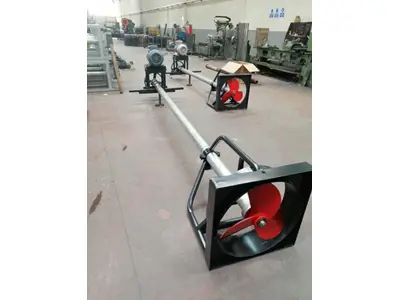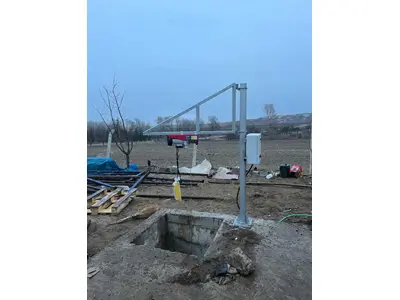Animal manure machines are used for processing and utilizing animal waste on farms. These machines make the waste more useful for use as fertilizer in agricultural fields. They also help manage waste correctly by considering environmental factors. Compost manure that supports recycling is also obtained from animal waste. Generally, compost part can be found in manure machines. There are different types of these machines, and each serves a specific function. For example, a manure mixer mixes different types of animal waste to create a homogeneous mixture. This mixture can then be applied to the soil. In this way, fertilizers obtained from natural animal waste provide more contribution to the soil, plants, and agriculture. Using organic manure rather than artificial fertilizer always yields better results for plants. Another machine used for the same purpose, providing recycling support, is the compost manure machine; it accelerates the conversion of organic waste (food waste, animal feed waste, bran, molasses, etc.) into compost by combining them. Thus, recycling is also supported. This compost manure produced from waste can be used to improve soil quality.
Another function used in animal manure machines is the manure separator machine. Sometimes, manure from compost machines or animal manure machines needs to be separated as liquid and solid. Therefore, separator machines are used. The term separator means a device or tool that separates one thing or substance from another. Thus, after fertilization processes, the manure separator machine is used to separate and distribute products through separation. Looking at their general features, separators have many benefits in industry. The first benefit is that the separator machine, in separating process, indicates where the manure should be used, enabling more yield with less loss. Also, this functional machine makes liquid manure more concentrated, providing higher efficiency to plants. The manure separator machine contributing to waste management maximizes efficiency in soil and plants through separated manure. Additionally, it is an eco-friendly machine, proving to be highly functional for farm operations.
Fertilizer Plant
Fertilizer plants play a significant role in the effective management and environmental evaluation of organic waste. These plants prepare organic waste by turning it into fertilizer for further use. To access more information on fertilizer plants, and see various brands' fertilizer plant productions, you can visit the website makinaturkiye.com.
Regarding the production process of fertilizer plants, the first stage involves collection and classification. This initial stage consists of collecting and classifying organic waste from various sources based on their types. Different types of organic materials such as agricultural residues, food waste from restaurants, farmyard manure are separated. Subsequently, the processing and shredding stage is proceeded with. Here, the collected organic wastes are processed in special machines to be shredded into smaller pieces. This is crucial for a more effective processing process. Shredding the wastes eases the subsequent separation and transformation stages. During this separation and transformation process; processed wastes are transformed by microorganisms through methods such as composting or fermentation. This process converts organic materials into compost manure. Crumbling the wastes enhances factors that increase the nutritional value and quality of compost manure. Then the produced compost undergoes quality control. During this stage, the nutritional value, moisture content, and quality of the manure are evaluated. Quality control is a critical stage to ensure that the fertilizer maximizes productivity in agricultural fields. Finally, the produced manure is stored in necessary conditions and environments, then distributed to agricultural fields or gardens for use. Fertilizer improves soil fertility, supporting plant growth and encouraging sustainable agricultural practices. The processing cycle of fertilizer plants aims to minimize the environmental impact of organic wastes and support sustainable production processes in agricultural fields.
What is Compost Manure and How is Compost Manure Made?
Compost manure is a nutritious soil improver obtained naturally from the decomposition of organic materials. This type of manure is used to enrich garden soil, increase plant nutrients, and enhance soil's water retention capacity. It is also an eco-friendly option for waste management. So, how is compost manure made? Here are the simple steps you can follow to make compost:
- Collect Materials: Organic materials you can use for compost manure include vegetable and fruit scraps, coffee grounds, tea leaves, leaves, straw, grass clippings, and wood scraps.
- Choose a Suitable Location: Choose a suitable area outside your garden to make compost manure. A sunny and well-ventilated area is preferable. Additionally, you can purchase household compost bins for ease of use. Mix Materials: Regularly mixing organic materials to ensure air circulation accelerates the decomposition process. For ease of use, you can also buy a manure mixer. Control Moisture: Keep the compost pile slightly moist. If it's too dry, decomposition slows down. If it's too wet, unpleasant odors and mold may occur. Therefore, many fertilizer plants have taps to drain excess water. Regular Mixing: The compost pile needs to be mixed at least once a week. You can facilitate this process by using manure mixers, mixing spoons, or sticks for manual mixing. This speeds up the decomposition process. Waiting: The compost process can last from a few weeks to a few months. Be patient and let the process progress naturally. Usage: When the materials are completely decomposed, you can use compost manure in your garden or on your plants.
Making compost manure is an eco-friendly method that can make your garden soil more productive.
Compost Manure in Sustainable Agriculture
Compost manure is a highly effective recycling method in sustainable agriculture. It reduces the carbon footprint and provides benefits to biodiversity. In terms of sustainable agriculture, compost manure enhances soil fertility, promoting healthier plant growth and higher crop yields. It also reduces the need for chemical fertilizers, decreasing the risk of soil and water pollution. Preventing soil erosion impedes soil loss, supporting sustainable agricultural practices. If you ask, how compost manure is made, the necessary steps regarding this issue are listed in the article.
In terms of the carbon footprint, compost manure production releases carbon dioxide during the decomposition of organic waste. Still, this emission is lower compared to the amount of carbon dioxide released during the natural decomposition of waste. Also, the organic matter content in the soil increases, enhancing carbon dioxide retention capacity.
Considering its biocompatibility, compost manure supports soil microorganisms, developing soil biology. This strengthens soil health and ecosystem balance. It provides resistance to plants, making them more resistant to diseases and pests. This reduces the need for chemical control and preserves biological balance. Lastly, compost manure supports the natural habitat and ecosystem while reducing the risk of harm to natural habitats through recycling organic waste.
Ultimately, the effects of compost manure on sustainable agriculture, carbon footprint, and biocompatibility support environmentally friendly farming practices, preserving ecosystem health, and contributing to a more sustainable use of natural resources.



























